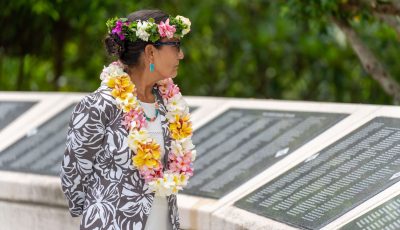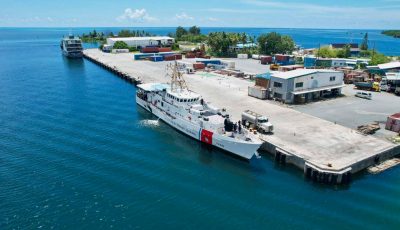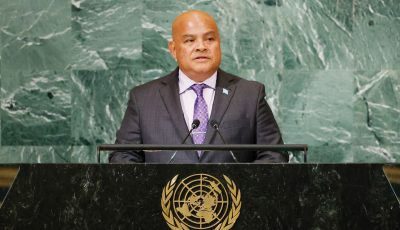Medical team provides mental health service to FSM
PACIFIC OCEAN—For many Micronesians, anxiety, depression, and other mental health concerns are culturally taboo subjects, laden with shame, stigma, and concealment. The people who suffer from these mental illnesses often suffer quietly.
The behavioral health team of Pacific Partnership 2015, consisting of a neuropsychologist and a behavioral health technician have been working closely with host nation providers in both Chuuk and Pohnpei to break this silence.
“In Micronesia, there is a traditional belief among members of the community that mental illness is due to bad magic or in some cases spiritual possession,” said Army Cpt. Lonnie Bradford, a psychologist attached to the Military Sealift Command joint high speed vessel USNS Millinocket. “Mental illness not only reflects poorly on the individual, but also brings shame on their family lineage.”
Through mutual cooperation with providers, the Behavioral Health and Wellness Program of Chuuk State was able to partner with other health booths to disseminate, raise awareness, and provide mental health interventions to the rural and central areas of Weno.
“This was the first time their mental health providers were able to partner with other medical fields like dentistry, optometry, and other medical specialties in the community,” said Bradford. “Our presences there not only increased the visibility of mental health in FSM, but also legitimized the message that mental health care is a priority every bit as essential as other medical services.”
Issues included substance abuse prevention targeting alcohol and tobacco in youth and post-typhoon emotional recovery. Chuuk state was recently affected by Typhoon Maysak causing widespread damage and destruction of homes.
“That is why partnering with Dr. Sylvia Wally [FSM’s only psychiatrist] to do community outreach engagements was such a vital step forward in debunking myths, educating the populace about mental health issues, and promoting the use of mental health services in a culturally sensitive way.”
In Pohnpei, the Behavioral Health team has worked side by side at the local mental health clinic as well as the prison where some of the most distressed patients are held. Moreover, the team recently completed workshops for non-mental health care providers in an effort to help fill the mental health service gap in FSM.
“The trainings were very well received,” said Bradford. “We were able to pass on a lot of knowledge to help treat mental illness and address substance abuse problems. We even had the opportunity to work with school teachers to help them identify alternative strategies outside of physical punishment to manage disruptive classroom behavior.”
The team is confident that the work completed here will enhance the visibility and standing of mental health services in the Federated States of Micronesia. They look forward to ongoing collaborations and exchanges as the mission continues throughout the south pacific.
Now in its 10th iteration, Pacific Partnership is the largest annual multilateral humanitarian assistance and disaster relief preparedness mission conducted in the Indo-Asia-Pacific region. While training for crisis conditions, Pacific Partnership missions to date have provided medical care to approximately 270,000 patients and veterinary services to more than 38,000 animals. Additionally, the mission has provided critical infrastructure development to host nations through the completion of more than 180 engineering projects.
Additional information on the Pacific Partnership mission is available on the U.S. Pacific fleet Pacific Partnership website at www.cpf.navy.mil/pacific-partnership/2015/. (Pacific Partnership Public Affairs)



























